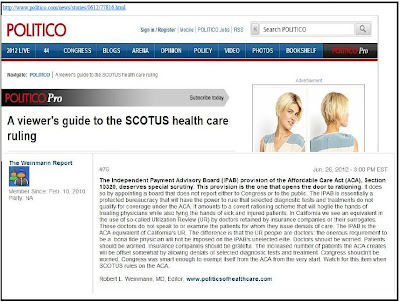No doubt about it, President Obama heard the criticism and has responded in kind. His announcement today that the individual mandate would be postponed by one year is designed to assuage the millions of subscribers who were satisfied with their health plans because they'll now be enabled to keep them for another year even if they're not compliant with the Affordable Care Act (ACA).
When queried by press about his constant reaffirmations of the original plan to promote the ACA in the face of a failed internet sign-up program, the president spoke to the people's hearts when he said "I'm not stupid enough" to have promoted an internet program had he known in advance that it was about to be an abject failure. He admitted the "fumble." Now that's language we can understand although we'd still like to know who in our capitol was stupid enough to have left the president holding the bag. In private business, such persons get reassigned to life-at-home although we've become inured to their walking away with golden parachutes.
Issues that weren't faced up to entirely include why increased cost may be an inevitable outcome. One argument we've used in this blog is that the ACA requires 60 year old grandmothers to purchase policies that include maternity care. Ridiculous? Maybe not. The same ACA requires 27 year olds to pay a rate that'll include prostate disease coverage for older men. That's just how all inclusive insurance works.
There's no denying that private insurers used to dump patients once sickness and injury claims were filed and that previous administrations tolerated this rueful practice. There's no denying that some insurers used to resurrect claimants' healthcare histories and retroactively cancel a claimant's policy because the applicant had acne that came under medical treatment at age 17 and wasn't reported at the time the applicant bought insurance coverage -- but that, too, was tolerated.
There's no denying that annual limits and lifetime limits would often ensnare the very sick into bankruptcy -- but this egregious insult and harm was also allowed by previous administrations. Obama's credit is that he sought to resolve these inequities but in his eagerness failed to keep his eye on the ball and misled the public. He is now gradually trying to dig himself out of the hole he dug -- today's step is a shovelful in the right direction.
But will a one-year postponement do enough or will it just give everybody breathing room until the inevitable cancelation catastrophe one year from now?
One problem is that pro-private-insurance interests opposed to the ACA are rooting for failure and will inevitably point out that President Obama is unilaterally suspending the law to recoup his own popularity with midterm elections pending. Proponents will support the president or seek further enabling legislation.
California will be a statewide workshop since we're being told on the one hand that in California one million cancelations have been sent out and will now need to be rescinded -- what will be the cost of that and who will pay for it? On the other hand, we're also told that California leads the nation in ACA sign ups.
Political pundits will notice that today's discussions have so far not mentioned the Independent Payment Advisory Board (IPAB) -- that is Sections 3403 and 10320 of the ACA that'll allow cancelation of benefits once the ACA gets too expensive. The IPAB is to be staffed by appointed bureaucrats at $165,000 per year. They will not need to report to Congress. Now there's something to worry about! Ask your Congressional representatives about it -- if they're making a beeline for legislation, tell them to take this item under advisement to strip the IPAB of its power to take away our increasingly hard-won benefits.



